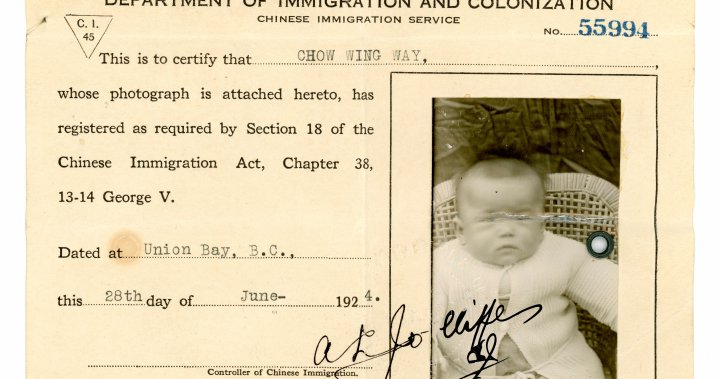Wayne Chow, a 100-year-old man from Victoria, British Columbia, has witnessed significant changes in the treatment of people from different ethnic backgrounds in the province throughout his lifetime. Born in Cumberland on Vancouver Island in 1924, Wayne’s father immigrated from China to work in the coal mines. Despite facing challenges as a Chinese Canadian, Wayne managed to raise five children and provide them with opportunities in Canada. Wayne was one of the first Chinese Canadians to receive a C.I.45 certificate, a document created to identify first-generation Chinese born on Canadian soil, in 1924. This certificate, which hangs in the Chinese Canadian Museum, marked a milestone for Chinese Canadians during a difficult time as it did not confer legal status in Canada.
Despite the limitations of the C.I.45 certificate, Wayne Chow’s story highlights the progress that has been made in Canada in terms of equality and social justice. His son, Douglas Chow, expressed gratitude for the opportunities his family has had in Canada and the positive changes that have occurred over the years. The repeal of the Chinese Exclusion Act in 1947, three years before Wayne graduated from the University of Manitoba with a degree in electrical engineering, marked a significant milestone in Canadian history. Wayne went on to have a successful career with BC Hydro, reflecting the opportunities and advancements that Chinese Canadians have been able to access in Canada.
The significance of Wayne Chow’s story is further highlighted by the existence of the Paper Trail exhibit in Vancouver, showcasing Chinese culture and heritage in Canada. Douglas Chow emphasized the importance of such exhibits in preserving and sharing the history of Chinese Canadians in the country, noting that without institutions like the Chinese Canadian Museum, this history might not have been documented or celebrated. Wayne’s personal experience and the challenges he faced as a Chinese Canadian during a time of discrimination and exclusion serve as a reminder of the progress that has been made in creating a more inclusive and just society in Canada.
Reflecting on his father’s journey and the changes he has witnessed in Canada, Douglas Chow expressed his gratitude for being part of a country that values equality and diversity. He underscored the importance of recognizing and celebrating the contributions of Chinese Canadians to the country’s history and development, noting that Wayne’s story is just one of many that deserve to be shared and remembered. Through exhibits like the Paper Trail exhibition, the stories and experiences of Chinese Canadians like Wayne Chow are honored and preserved for future generations to learn from and appreciate.
In conclusion, Wayne Chow’s centennial celebration serves as a reminder of the resilience and perseverance of Chinese Canadians in the face of discrimination and exclusion. His story highlights the progress that has been made in creating a more inclusive and equitable society in Canada, as well as the importance of preserving and sharing the history of Chinese Canadians. Through exhibits like the Paper Trail exhibition and the work of institutions like the Chinese Canadian Museum, the contributions and experiences of individuals like Wayne Chow are recognized and celebrated, contributing to a more diverse and inclusive understanding of Canadian history. Wayne’s story stands as a testament to the strength and resilience of the Chinese Canadian community and their ongoing contributions to the fabric of Canadian society.


